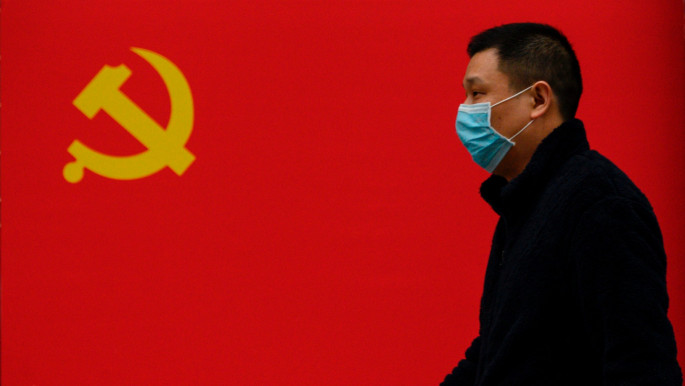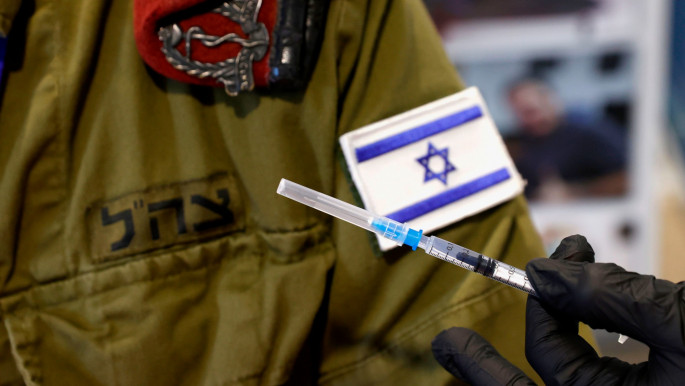The geopolitics of vaccine diplomacy in the Middle East
Beijing's production of its own vaccines, through its companies Sinopharm and Sinovac, aims to further its Covid-19 diplomacy and act as a counterweight to Western alternatives, including the US-based Moderna vaccine, the German American company Pfizer and the British-Dutch Oxford-AstraZeneca vaccine.
China has aimed to supply its vaccines across Asia and elsewhere in the world, like Brazil. Yet the Middle East is a key area of focus, as it fits into its so-called Belt and Road Initiative (BRI), designed to connect Asia with Africa and Europe through land and sea networks via trade and infrastructure projects.
Aside from Beijing's vaccine efforts serving as a diplomatic tool, providing a successful vaccine is a strong publicity move, particularly after criticism from figures like former US president Donald Trump over how the virus originated in China, which threatened China's global image.
Russian officials meanwhile claimed that its Sputnik V was more than 95 percent effective, which if true would make it more effective than Pfizer, Moderna and Oxford-AstraZeneca's vaccines. Russia approved its vaccine last August, making it the first country to announce one. And since then, it has aimed to supply it to various countries whose regimes it has built stronger relations with.
 |
China and Russia have seen an opportunity to push their own products as a diplomatic tool in the region, in competition with the United States |  |
Anti-Covid-19 leadership
China has initially engaged in Covid-19 diplomacy through providing aid to various countries which were hit by coronavirus.
This includes greater cooperation with Gulf Cooperation Council (GCC) states, including the United Arab Emirates (UAE) which already established itself as a leader in the anti-coronavirus battle, through humanitarian gestures to various countries in the region and Africa, and cooperation with international bodies like the World Health Organisation (WHO).
It also sent medical experts and supplies such as masks to various African countries, the first of which was Algeria. Due to Beijing's fledging coronavirus diplomacy in the Gulf, its vaccine has been approved in some GCC countries, including the UAE and Bahrain.
 |
|
| Read more: Covid-19 diplomacy: Mapping China's Health Silk Road in the Middle East |
Despite disagreements over Chinese vaccines' effectiveness - one Brazilian researcher said in November that the company Sinovac's product was 74% effective during clinical trials but revised it to 50.4% during the pandemic - the UAE and Bahrain cited an 86% effectiveness rate following phase three trials
There are benefits for Abu Dhabi too, as gaining China's vaccine would strengthen its relations with Beijing, boost investments, and enhance regional cooperation between both countries.
This also reflects the UAE's "eastwards" shift away from a dependency on Washington, particularly as Joe Biden's presidency may curtail Abu Dhabi's foreign policy assertiveness that it enjoyed under the Trump administration.
The UAE also approved Russia's Sputnik vaccine for emergency use on 21 January following trials, highlighting its fledgling ties with Moscow too.
Though it currently faces a surge in cases, the UAE has aimed to position itself as an active leader in the anti-Covid-19 fight, having delivered aid and cooperated with the WHO. The UAE may also be keen to further this proactive image by vaccinating much of the population. Abu Dhabi aims to vaccinate over half of the population by the end of March.
China also delivered vaccines to Iraq, where it has pursued large construction and investment deals as a central location for its BRI initiative.
 |
The United States has failed to assert itself in combatting the virus in the Middle East region, leaving a vacuum that Beijing has been able to fill |  |
Iran meanwhile explicitly refused to accept any American vaccine, amid approving the COVAX vaccine from Gavi, the Coalition for Epidemic Preparedness Innovations (CEPI) and WHO. An Iranian health official said Tehran would also consider Russia and China's vaccine, highlighting Tehran's ties with Moscow and Beijing.
Saudi Arabia was the first Arab country to accept the Pfizer-BioNTech vaccine, while Jordan, Qatar and Oman have also followed suit in approving doses from the German American company. This shows these countries are looking to balance relations with the US.
Filling the vacuum
Russia has also expanded its Covid-19 vaccine diplomacy in the Middle East. Syria's Minister of Foreign Affairs Faisal Mekdad said on 22 December that his government was in talks with Russia to acquire the Sputnik vaccine.
"We hope the Syrian people will receive the [Sputnik V] vaccine and other Russian-made vaccines, because they trust them more than Pfizer and other vaccines," said Mekdad.
This is inevitable after Russia's involvement in Syria's civil war, following its military intervention to ensure Bashar Al-Assad's regime's survival. Russia now has considerable influence over the country and supplying the vaccine there would further consolidate this.
 |
Russia has also expanded its Covid-19 vaccine diplomacy in the Middle East |  |
Meanwhile, as Israel imported the Pfizer jab, and is criticised for disregarding the needs of five million Palestinians under occupation, Russia's Sputnik vaccine was accepted by the Palestinian Authority (PA), showing how Moscow is filling the vacuum there.
While Egypt also approved the Oxford-AstraZeneca vaccine, its health ministry on 4 January announced it had accepted China's Sinopharm vaccine, and that it would be available to all health workers on Sunday. Cairo previously approved Russia's vaccine, showing its growing ties to Moscow, particularly after Russian weapons sales to Egypt have increased in the last few years. However, the efficiency of the delivery of China's vaccines makes it more welcome.
 |
|
| Read more: Why is Israel denying Covid vaccine to Palestinians? Two words: Medical apartheid |
One Egyptian doctor described a "tug of war" to The Guardian over concerns about surging Covid-19 cases and "the risk of an untrusted vaccine with not enough supporting data," showing again how China is capitalising on economically insecure countries' vulnerabilities.
Turkey has stepped up efforts to vaccinate its civilians, having inoculated over one million people to date. Turkey announced it would receive a further 6.5 million doses from China on Monday, making the total 10 million. President Recep Tayyip Erdogan called on Turks to ignore scepticism over the vaccine's effectiveness.
The reasons for Ankara pursuing China's vaccine specifically are not clear. However, Turkey's government under the Freedom and Justice Party (AKP) has somewhat shifted away from Washington, such as its purchasing of Russian S-400 missile defence systems in defiance of the US. Prioritising China's vaccine is another indication of this.
Overall, as China has expanded its foreign policy engagement during the coronavirus crisis, its use of "vaccine" diplomacy will be a further boost in a bid to enhance its global clout.
And given that the United States has failed to assert itself in combatting the virus in the Middle East region, a vacuum has formed that Beijing is able to fill.
Jonathan Fenton-Harvey is a journalist and researcher who focuses on conflict, geopolitics and humanitarian issues in the Middle East and North Africa
Follow him on Twitter: @jfentonharvey





 Follow the Middle East's top stories in English at The New Arab on Google News
Follow the Middle East's top stories in English at The New Arab on Google News


